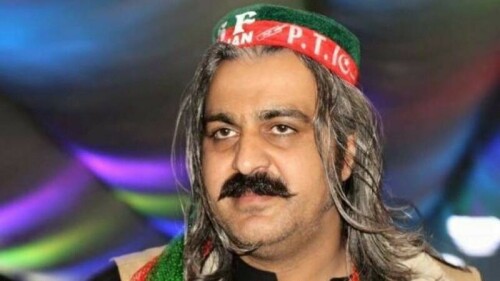PESHAWAR, May 30: The Qaumi Aman Jirga (peace jirga) has called for immediate ceasefire in the region to end the conflict that has been besetting Afghanistan and Federally Administered Tribal Areas (Fata) of Pakistan for over a quarter of century.
The peace jirga concluded here on Wednesday with an eight-point declaration that called for stopping all sorts of foreign interference and instigation of violence in the region.
Pakistan, Afghanistan and its neighbouring countries should play their positive roles in creating conducive environment for facilitating a meaningful intra-Afghan dialogue, the declaration said.
The jirga decided to constitute a permanent committee, to be headed by its convener and former federal minister Mohammad Afzal Khan Lala, to develop an action plan for restoration of peace on the Afghan land through a process of reconciliation.The Adviser to Afghan President Hamid Karzai, Haji Din Mohammad, representatives of major political parties including Jamiat Ulema-i-Islam-Fazl and civil society groups from both the countries signed the unanimously adopted declaration that was announced at the jam-packed Nishtar Hall.
The jirga suffered a setback when Pakhtunkhwa Milli Awami Party of Mahmood Khan Achakzai boycotted it at the eleventh hour. Jamaat-i-Islami, Pakistan Peoples Party-Sherpao and Pakistan Tehrik-i-Insaf had declined invitations to participate in the event. Interestingly, Pakistan’s map, drawn on the main banner displayed on the stage, was found erased on the second day of the jirga.
The declaration said that though Afghan land had experienced prolonged wars yet the present war, fought for the last three decades by state and non-state actors and supported from abroad, had led to the killings of millions of Afghans, leaving another one million wounded and displaced and their properties destroyed.
The war had left very negative and severe impacts on political, economic, cultural and social lives of the Afghans on both sides of the Durand Line. “Some of these negative, cruel and intolerable acts have tarnished the image of the Afghan culture and religion in the world,” it said.
The declaration said that Afghan land, a land of peace and dialogues, was witnessing bloodshed and homicide and the whole area was converted into a dump of explosives and ammunition.
It said that Pakhtuns, who were portrayed as terrorists, were basically enlightened, tolerant and moderate but they were exploited by the outsiders for their ulterior motives. So they were killed as well as taunted, it added.
The declaration called upon developed nations to generously contribute and start reconstruction, rehabilitation and developmental programmes in the war-ravaged areas of Pakhtun land for alleviating poverty and overcoming backwardness and bringing it on a par with the developed areas of the region.
Addressing the jirga, Haji Din Mohammad, who had helped Osama bin Laden to stay in Jalalabad, Afghanistan expressed deep concern over the plight of Pakhtuns in Pakistan and Afghanistan.
He said that Afghan government had set up a high-powered council to negotiate peace deal with the resistance groups. He proposed that Pakhtuns in Pakistan should also arrange jirga and hold talks with stakeholders to restore peace.
Awami National Party provincial president Senator Afrasiab Khattak said that extremism and militancy were promoted in Pakhtun society through the power of money. He said that the withdrawal of Soviet forces had created political and administrative vacuum in Afghanistan that was filled by non-state actors.
Suggesting solutions to the lingering war in Afghanistan, he said that there should be intra-Afghan dialogue before pullout of Nato forces. Besides intra-Afghan dialogue, regional countries should also hold talks, he said. Third, he suggested, world powers should also negotiate to find out sustainable solution after leaving of Nato forces otherwise the dream of lasting peace in the region would never come true.
Many speakers demanded of the International Criminal Court to conduct investigations into the killing of thousands of Pakhtuns and destruction of their properties in the conflict. They said that foreign forces had imposed war on Pakhtuns to protect their political, strategic and economic interests.












































Dear visitor, the comments section is undergoing an overhaul and will return soon.